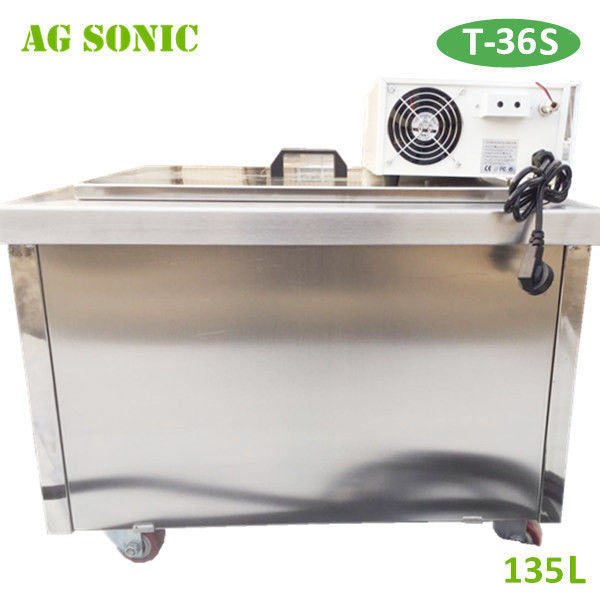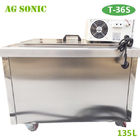135L 1800W Power Industrial Ultrasonic Cleaner With Heater for 3D Printing
ULTRASONICS FOR 3D Pringting:
Companies and organizations with 3D printers can rely on ultrasonic cleaning technology to remove dirt and contamination from various parts and components far faster and more efficiently than traditional cleaning methods. Ultrasonic waves precision clean the most inaccessible areas of delicate printer components removing microscopic contaminants such as skin and fine dust particles. Additionally, safe removal of the 3D object’s modeling support without affecting the filament-printed object is faster and more effective than water sprays or manual scrubbing.
We know that the cleanliness of the parts you process reflects on your business and reputation. Count on us to provide the tools, training, and support you need to maximize your production and profitability.
Ultrasonics can clean:
- print heads
- extruder and nozzles
- circuit boards
- arduino electronics
- controller modules
- platform surfaces and plates
- heat beds
- filament spools
- power supplies
- switches
- cooling fans
- belts and bearings
Efficiently Removing:
- dirt and grime
- varnishes and paint
- oil and grease
- metal shavings
- lubricants
- rusts
- scale and carbon buildup
- flux residue from soldering
Specifications:
| Specifications for ultrasonic cleaner T-36S |
| Model |
T-36S |
| Tank capacity |
135L |
| Tank size |
600x500x450mm |
| Unit size |
740x640x670mm |
| Tank material |
2mm SUS304 |
| Ultrasonic power |
1800W |
| Heating power |
4.5KW |
| Timer |
1-99min adjustable |
| Heater |
0-80c adjustable |
| Frequency |
28/40khz |
| Control |
External generator, more stable |
| Optional |
Oil filter system, pneumatic lift, rinsing tank, etc. |
| Voltage |
110V, 1phase; 220V, 3phases/220V, 1phase; 380V, 3phases |
| Warranty |
1 year |
| Packing |
1unit/wooden case |
Frequently Asked Questions:
How do I get the best ultrasonic cleaning?
There are many considerations important to ultrasonic cleaning. Optimizing these variables will produce the best cleaning. The most important decisions to be made are choosing the proper cleaning solution, cleaning at the right temperature for the correct amount of time, and choosing the right size and type of ultrasonic cleaner.
Can ultrasonic cleaning damage my parts?
With certain cautions, ultrasonic cleaning is considered safe for most parts. While the effects of thousands of implosions per second is very powerful, the cleaning process is safe since the energy is localized at the microscopic level. The most important cautionary consideration is the choice of cleaning solution. Potentially adverse effects of the detergent on the material being cleaned will be enhanced by the ultrasonics. Ultrasonic cleaning is not recommended for the following gemstones: opal, pearl, emerald, tanzanite, malachite, turquoise, lapis and coral.
What is direct and indirect cleaning?
Direct cleaning occurs when the parts are cleaned in a cleaning solution which fills the cleaner, usually inside a perforated tray or mesh basket. The limitation of direct cleaning is that a solution must be chosen that will not damage the ultrasonic cleaner. Indirect cleaning involves placing the parts to be cleaned in an inner non-perforated tray or beaker that often contains a solution that the user may not want directly filling the ultrasonic tank. When choosing indirect cleaning, make sure that the water level inside the tank itself is maintained to the fill line (about 1″ from the tank top) at all times.
Why is a special solution required for cleaning?
Soils adhere to the parts… if they didn’t, the soil would just fall off the parts! The purpose of the solution is to break the bonds between parts and their soils. Water alone has no cleaning properties. The primary purpose of the ultrasonic activity (cavitation) is to assist the solution in doing its job. An ultrasonic cleaning solution contains various ingredients designed to optimize the ultrasonic cleaning process. For example, increased cavitation levels result from reduced fluid surface tension. An ultrasonic solution will contain a good wetting agent or surfactant.


 Your message must be between 20-3,000 characters!
Your message must be between 20-3,000 characters! Please check your E-mail!
Please check your E-mail!  Your message must be between 20-3,000 characters!
Your message must be between 20-3,000 characters! Please check your E-mail!
Please check your E-mail! 


